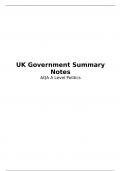UK Government Summary
Notes
AQA A Level Politics
,UK Constitution.................................................................3
Development of the constitution................................................................................................. 3
Sources of the constitution.......................................................................................................... 3
Principles of the constitution....................................................................................................... 3
Constitutional reform (Blair, Brown)............................................................................................ 4
Constitutional Reform (lib-con coalition)......................................................................................4
Reform from 2015-2020.............................................................................................................. 4
Debates over the protection of rights.......................................................................................... 5
Who should make laws................................................................................................................ 5
Should the UK adopt a codified, entrenched constitution?...........................................................5
Devolution........................................................................6
The roles, powers and responsibilities of different devolved assemblies.....................................6
Impact of devolution on uk government......................................................................................8
UK Parliament...................................................................8
Structures of the chambers......................................................................................................... 9
Functions of parliament............................................................................................................... 9
House of Lords assessment....................................................................................................... 11
Relationship between parliament and the executive.................................................................12
UK Executive...................................................................12
The Cabinet............................................................................................................................... 12
The prime minister.................................................................................................................... 14
Relationship between Prime minister and executive.................................................................15
examples of the power of the pm and cabinet...........................................................................16
UK Judiciary.....................................................................16
Composition of judiciary + appointments process.....................................................................16
Judicial review + hra.................................................................................................................. 17
Influence of judiciary on other branches of government............................................................18
, UK Constitution
DEVELOPMENT OF THE CONSTITUTION
• Magna Carta - Signed in 1215 by King John. Main provisions include: freedom of
church from royal interference, king couldn’t raise tax without consent of the people,
right to due process of law, right to trial by jury, right to a free and fair trial
• Bill of Rights 1688. + places limits on the use of royal prerogative, said only Parlt.
could maintain a standing army, formally established parliamentary sovereignty. -
rights outlined were very vague, king still had enormous power, it was only a statute
• Act of Settlement 1701 - Parliament could chose the monarch, judges couldn’t be re-
moved without Parlts. consent, the monarch couldn’t declare war without Parlts. con-
sent (unless it was defensive), the monarch had to be Protestant and not married to
a Catholic
• Acts of Union. 1707 joined Scotland and England after the former had bankrupted it-
self. 1800 Ireland joined, mainly for protection against invasion. 1921 Ireland was re-
moved after it had partitioned into Ireland and Northern Ireland.
• Parliament Acts. 1911 gave Commons power over money bills, said Lords could only
delay a bill for 2 years, reduced Parliamentary terms from 7 to 5 years. 1949 Lords
could only delay bills for up to 1 year.
• The EU. European Communities Act 1972 meant the UK joined the European Eco-
nomic Community, the European Coal and Steel community and the European
Atomic Energy Community. EU law took precedent over UK law. European With-
drawal Act 2017 gave the PM the power to invoke article 50 to withdraw the UK from
the EU
SOURCES OF THE CONSTITUTION
• Statute law - A law written by parliament, passed by parliament (or any other legisla-
tive body) e.g 1911 Parliament Act, 1969 Representation of the People act, 1998 hu-
man rights act.
• Common law/ Case Law. The body of legal precedent resulting from rulings of other
senior judges. It could be under written by statute law. For example, things like mur-
derers going to jail.
• Conventions. Things have been done for awhile and people continue to do. There are
no legal ramifications if you don't follow convention. For example, Salisbury conven-
tion, Lords cannot stop the law that the government have on their manifesto.
• Authoritative works. A textbook/book that was written a long time ago and has
gained such fame and status that people follow its teachings as if it were law. For ex-
ample Badgehots ‘the English Constitution’ of 1867, or AV Dicey’s ‘the introduction
to the study of the law of the constitution.’
• Treaties/international agreements. International agreements that the government is
obliged to abide by. For example, the European Convention on Human Rights 1953.
PRINCIPLES OF THE CONSTITUTION
• For a constitution to be codified it must be: authoritative (i.e higher than standard
legislation), entrenched, judicable
• Entrenchment means that laws cannot be easily changed or amended, often helps to
protect the rights of the people
• A country often needs a supermajority in the legislature and approval via a referen-
dum to make a constitutional change
• The UK constitution is uncodified and unwritten so it is also unentrenched





